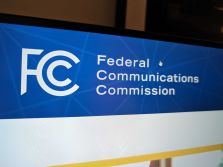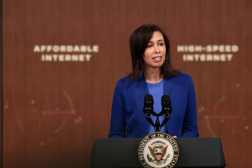State leaders say net neutrality repeal could upend equitable service delivery

Since the Federal Communications Commission voted to repeal net neutrality rules on Dec. 14, much of the public discourse has centered around how this could affect consumers, but some state government officials are now reporting concern that it could affect their ability to adequately provide services as well.
The FCC has yet to release a final version of the repeal, likely to protect it from being overturned by lawsuits that will be filed by net neutrality supporters like New York Attorney General Eric Schneiderman, who decried the decision directly afterward, calling it “a blow” to “everyone who cares about a free and open internet.” Minnesota Attorney General Lori Swanson has since joined the lawsuit, which can not be filed until the rule change is entered in the Federal Register.
Though a draft gives an idea of what the final repeal will look like, the absence of the final document has left the public wondering how the elimination of rules that allowed for equal priority and access to all content and services will manifest. Though some argue that fear of losing customers will prevent providers from making changes, others say that regional monopolies and duopolies could give providers the confidence to introduce tiered pricing, resulting in higher fees for the same service, or slower or missing websites and services.
Connecticut Chief Information Officer Mark Raymond told StateScoop there’s also concern that the repeal could prevent state governments from providing equitable access to citizens — a banner issue in blue states like Connecticut.
“When you think about how much certain segments of the economy rely on digital services, the government is even more [dependent],” Raymond said.
Raymond told StateScoop that while Connecticut still has no official plans to fight the repeal with new measures that would encourage internet service providers to continue providing neutral access to content — like the states of New York and Washington have done — they are talking to those states and weighing options.
Washington Gov. Jay Inslee, a Democrat, was the first high-profile state leader to take a substantive stand against the repeal, introducing a mutli-pronged defense that began even before the FCC plan was announced. A new state initiative intends to hold companies to their commitments not to “block websites, throttle speeds or impose prioritization pricing” by leveraging the state’s buying power and by creating a statewide internet speed test that will give higher visibility to what ISPs are doing.
New York is taking a similar tact, hitting companies in their pocketbooks if they choose to abandon good-faith net neutrality. New York Assemblymember Patricia Fahy told Fast Company that there’s a similar precedent that companies adhere to certain labor practices or use U.S.-manufactured steel to compete.
“There’s a decent amount of precedent for saying, if you want a state contract, you have to meet such and such requirements,” said Fahy, a Democrat.
California state Sen. Scott Wiener, a Democrat, announced plans for legislation, citing concerns similar to Raymond’s — it’s the marginalized communities that government is already struggling to serve that could be hurt most be the rule change.
“If the FCC is going to destroy net neutrality and create a system that favors certain web sites just because they can pay more money, California must step in and ensure open internet access,” Wiener said.
The repeal could affect equal access to state government services in two ways, Raymond said. If government sees a raise in internet costs, that will indirectly restrict departments from providing new services that are already short on cash. Or the impact could be more direct, he said, and government services could be moved to a more expensive service plan being offered to citizens, if an ISP so chooses. Connecticut is considering introducing measures that would prohibit the latter, Raymond said.
“There have been internal conversations — do we need to do something on behalf of the citizens for their protection?” Raymond said.
And while some states scramble to ready a defense against the repeal, others seem unconcerned. Wyoming Chief Information Officer Tony Young said he supports the repeal and doesn’t believe the FCC’s ruling will change anything for state government.
“The implementation of net neutrality was an executive and political response and a vague attempt to regulate the internet,” Young wrote StateScoop in an email.
The contrast between net neutrality opponents like Young and supporters like Connecticut Gov. Dannel Malloy is as stark as it gets — Malloy called the repeal an “all-out assault” on the internet.
“Open internet access is essential to our economic competitiveness,” Malloy said. “This move is anti-consumer, anti-competitive, flies in the face of the best interests of the people of our nation, and will have a damaging impact on the ability of Americans to utilize the internet.”
About 129 million Americans have access to just one high-speed provider, according data published by the FCC in 2016. This statistic is based on the FCC’s definition of a fixed broadband connection meeting 25 Mbps download speed and 3 Mbps upload speed — wireless services like 4g are not included.
And while net neutrality supporters worry that a lack of competition in the ISP market will encourage companies to take advantage of the rule change, others — like Christopher Mitchell of the Institute for Local Self-Reliance — tell StateScoop it could be the kick in the pants some localities need to build their own networks, like hundreds of others have done in years past.
This article was updated on Jan. 4, 2018 to clarify that, according to the FCC, 129 million Americans have access to only one fixed broadband connection.






